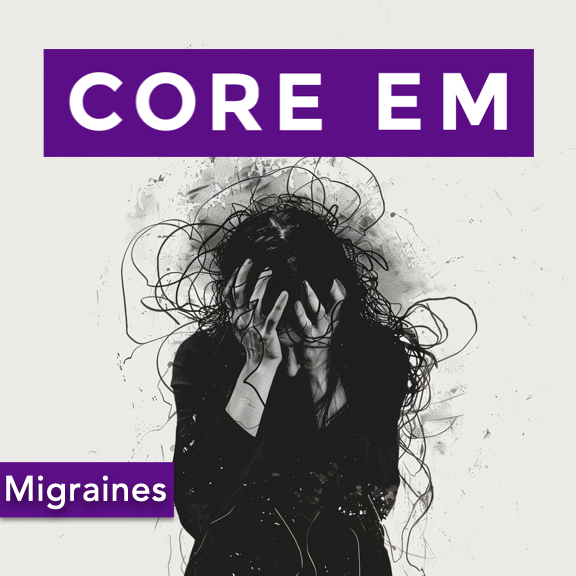Core EM - Emergency Medicine Podcast

Episode 201: Migraines

We discuss migraines with one of the authorities in the field.
Hosts:
Benjamin Friedman, MD of Montefiore
Brian Gilberti, MD
https://media.blubrry.com/coreem/content.blubrry.com/coreem/Migraines.mp3
Download
Leave a Comment
Tags: Neurology
Show Notes
Initial Approach to Diagnosing Migraines:
- Differentiating between primary headaches (migraine, tension-type, cluster) and secondary causes (e.g., subarachnoid hemorrhage).
- The importance of patient history and reevaluation after initial treatment.
- Recognizing the unique presentation of cluster headaches and their management implications.
Effective Acute Migraine Treatments:
- First-line treatments including anti-dopaminergic medications like metoclopramide (Reglan) and prochlorperazine (Compazine), and parenteral NSAIDs like ketorolac (Toradol).
- The limited role of triptans in the ED due to side effects and less efficacy compared to anti-dopaminergics.
- The use of nerve blocks (greater occipital nerve block and sphenopalatine ganglion block) as effective treatments without systemic side effects.
Treatments to Avoid or Use with Caution:
- Diphenhydramine (Benadryl): Studies show it does not prevent akathisia from anti-dopaminergics nor improve migraine outcomes.
- IV Fluids: Routine use is not supported unless the patient shows signs of dehydration.
- Magnesium: Conflicting evidence with some studies showing no benefit or even harm.
Managing Refractory Migraines:
- Second-line treatments including additional doses of metoclopramide combined with NSAIDs or dihydroergotamine (DHE).
- Considering opioids as a last resort when other treatments fail.
- The potential use of newer medications like lasmiditan and CGRP antagonists.
Preventing Recurrence of Migraines:
- Administering a single dose of dexamethasone (4 mg IV) to reduce the risk of headache recurrence after discharge.
- Prescribing NSAIDs or triptans upon discharge for outpatient management.
- Recognizing and addressing chronic migraine, and initiating preventive therapies like propranolol when appropriate.
Key Takeaways
- Differentiate Primary from Secondary Headaches and Reassess After Treatment:
- Use patient history and reevaluation post-treatment to distinguish migraines from more serious conditions, reducing unnecessary imaging and procedures.
- First-Line Treatments Are Effective:
- Anti-dopaminergic medications and NSAIDs are the mainstay of acute migraine treatment in the ED.
- Reserve opioids for cases unresponsive to multiple lines of treatment.
- Avoid Unnecessary Interventions:
- Diphenhydramine and routine IV fluids do not have proven benefits and can be excluded to streamline care.
- Utilize Nerve Blocks for Refractory Cases:
- Greater occipital nerve blocks and sphenopalatine ganglion blocks are effective alternatives for patients not responding to medication.
- Prevent Recurrence with Dexamethasone and Outpatient Planning:
- A single IV dose of dexamethasone can help prevent recurrence.
- Provide prescriptions and consider preventive therapies to reduce future ED visits.
Read More






 Visit Podcast Website
Visit Podcast Website RSS Podcast Feed
RSS Podcast Feed Subscribe
Subscribe
 Add to MyCast
Add to MyCast